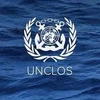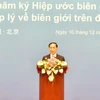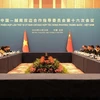The fourth international seminar on the East Sea opened in Ho Chi Minh City on November 19, drawing 200 domestic and international experts and scholars.
The event, themed “East Sea: Cooperation for Regional Security and Development”, takes place at a time when the international community celebrates the 30 th anniversary of the signing of the UN Convention on the Law of the Sea and the 10 th year since the signing of the Declaration on the Conduct of Parties in the East Sea (DOC).
In his opening speech, President of the Diplomacy Academy of Vietnam Dang Dinh Quy said the East Sea is a region with one of the most complicated disputes in the world.
The situation is mounting due to developments in many countries themselves - economics, politics, military and security - as well as sea disputes and non-traditional security threats such as piracy, pollution, the degradation of maritime resources and climate change, he added.
Therefore, effective measures are needed to realise the results of studies and policy recommendations, he said.
According to Quy, enormous effort has been made by parties directly and indirectly concerned to the dispute, contributing to better cooperation and conflict prevention to preserve the East Sea as an area of peace.
He highlighted the importance of implementing DOC, and the agreement reached between ASEAN and China on building the Code of Conduct of Parties in the East Sea .
At a time of rising tension in the East Sea , diplomatic endeavours by concerned parties as well as by ASEAN and China have not yet been interrupted, Quy noted.
He said that scholarly opinions and reports have helped the public understand the nature of the disputes as well as policy makers consider carefully their national interests before making any decision relating to the East Sea .
According to the organising board, the seminar is to exchange study conclusions and discuss the importance of the East Sea from the viewpoints of international law and international relations, the interests of concerned parties and the recent developments in the East Sea .
It also proposes to the governments of directly and indirectly concerned parties to strengthen cooperation to prevent and control conflicts and crises in the East Sea .
The three-day event also recommends ways academic studies can be made useful to leaders in East Sea policy-making./.
The event, themed “East Sea: Cooperation for Regional Security and Development”, takes place at a time when the international community celebrates the 30 th anniversary of the signing of the UN Convention on the Law of the Sea and the 10 th year since the signing of the Declaration on the Conduct of Parties in the East Sea (DOC).
In his opening speech, President of the Diplomacy Academy of Vietnam Dang Dinh Quy said the East Sea is a region with one of the most complicated disputes in the world.
The situation is mounting due to developments in many countries themselves - economics, politics, military and security - as well as sea disputes and non-traditional security threats such as piracy, pollution, the degradation of maritime resources and climate change, he added.
Therefore, effective measures are needed to realise the results of studies and policy recommendations, he said.
According to Quy, enormous effort has been made by parties directly and indirectly concerned to the dispute, contributing to better cooperation and conflict prevention to preserve the East Sea as an area of peace.
He highlighted the importance of implementing DOC, and the agreement reached between ASEAN and China on building the Code of Conduct of Parties in the East Sea .
At a time of rising tension in the East Sea , diplomatic endeavours by concerned parties as well as by ASEAN and China have not yet been interrupted, Quy noted.
He said that scholarly opinions and reports have helped the public understand the nature of the disputes as well as policy makers consider carefully their national interests before making any decision relating to the East Sea .
According to the organising board, the seminar is to exchange study conclusions and discuss the importance of the East Sea from the viewpoints of international law and international relations, the interests of concerned parties and the recent developments in the East Sea .
It also proposes to the governments of directly and indirectly concerned parties to strengthen cooperation to prevent and control conflicts and crises in the East Sea .
The three-day event also recommends ways academic studies can be made useful to leaders in East Sea policy-making./.



















